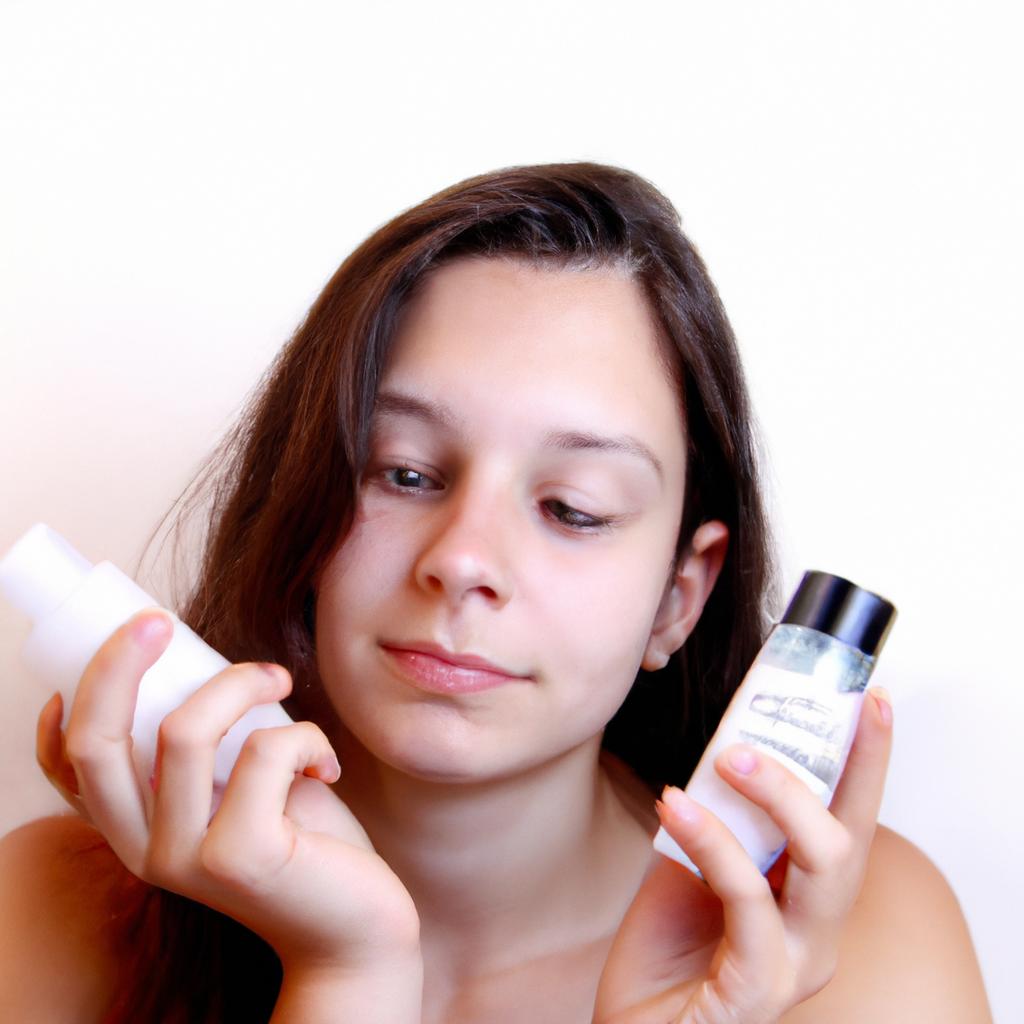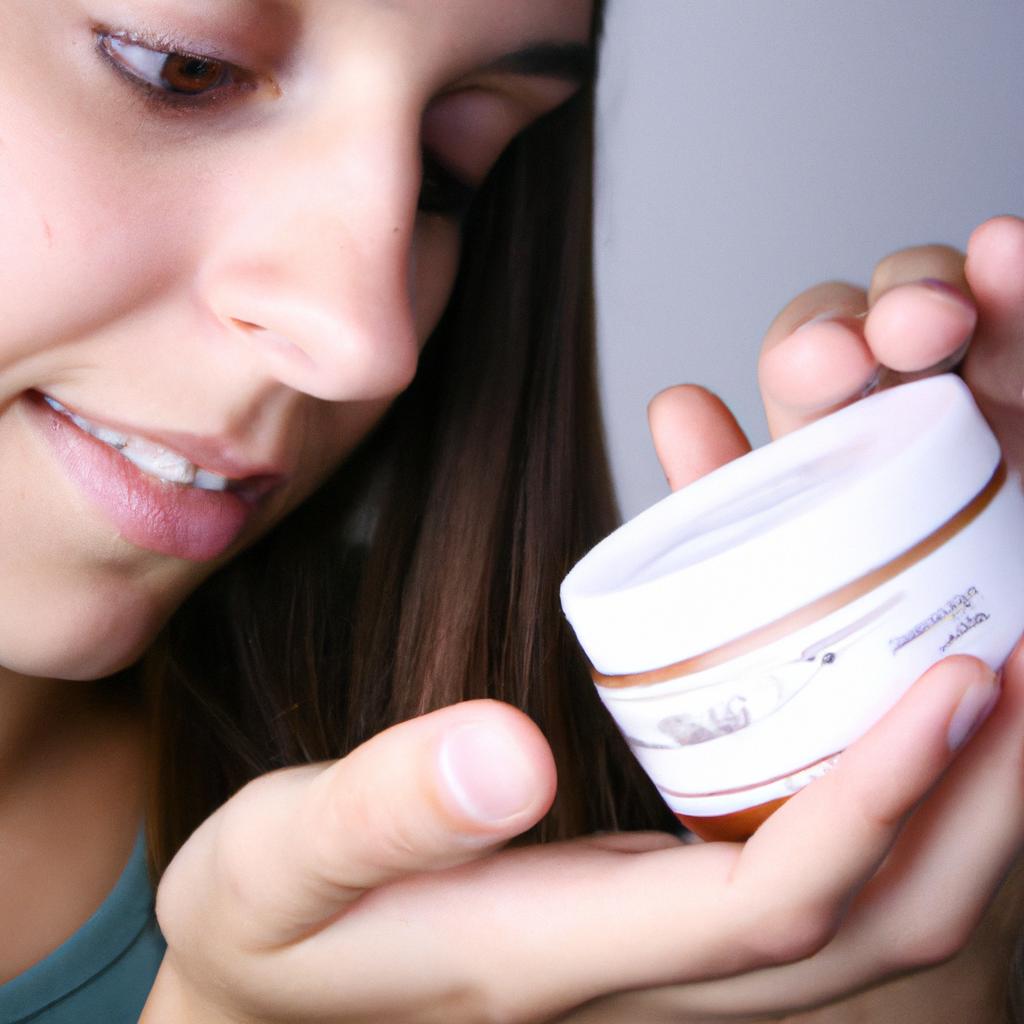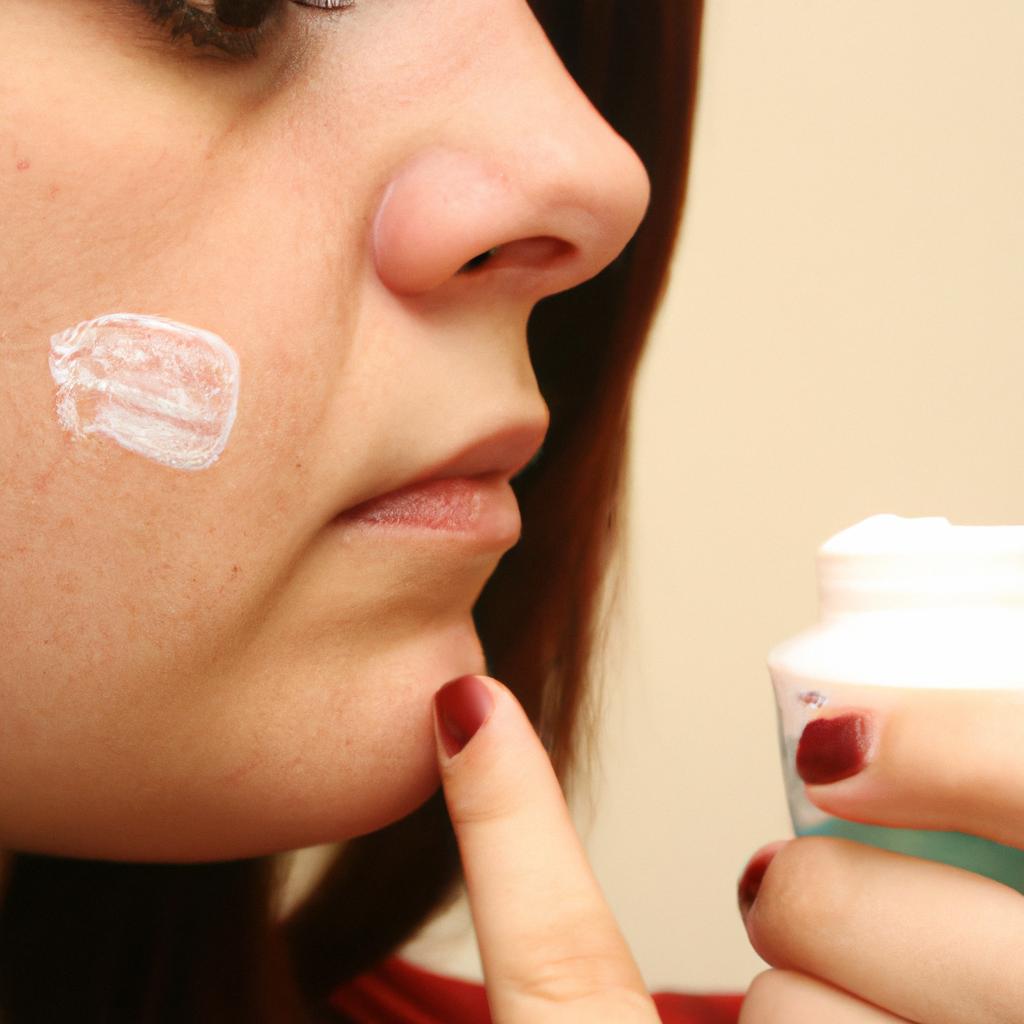Skin care products have gained immense popularity in recent years, with individuals seeking various ways to enhance the texture and appearance of their skin. The desire for improved skin texture stems from the understanding that clear and smooth skin not only promotes physical attractiveness but also boosts self-confidence. For instance, imagine a working professional who has struggled with acne scars for years. Despite excelling in their career, they often feel insecure due to the visible reminders of past breakouts on their face. In such cases, using appropriate skin care products can be transformative, helping to fade scars and improve overall skin texture.
The benefits of utilizing skin care products extend far beyond aesthetics alone. Properly formulated products have been scientifically proven to provide nourishment and hydration to the skin, resulting in enhanced elasticity and firmness. This is particularly crucial as we age since natural processes like collagen depletion lead to sagging or wrinkling of the skin. By incorporating effective skincare routines into daily life, individuals can significantly mitigate these signs of aging while promoting healthier-looking skin.
In this article, we will explore how different types of skincare products work towards improving skin texture by addressing common concerns such as uneven tone, roughness, and blemishes. Additionally, we will delve into the science behind key ingredients found in many skincare products and how they contribute to the overall improvement of skin texture.
One common skincare product that targets uneven skin tone is a brightening serum or cream. These products often contain ingredients such as vitamin C, kojic acid, or niacinamide, which help to reduce the appearance of dark spots and hyperpigmentation. They work by inhibiting the production of melanin, the pigment responsible for giving color to our skin. With consistent use, these brightening agents can help even out skin tone and promote a more radiant complexion.
To address roughness and dryness, moisturizers play a crucial role in improving skin texture. Moisturizers are formulated with hydrating ingredients like hyaluronic acid, glycerin, or ceramides that replenish moisture levels in the skin. By providing hydration, moisturizers help to restore the skin’s natural barrier function and prevent water loss. This leads to a smoother and softer texture over time.
For those dealing with blemishes or acne-prone skin, products containing ingredients like salicylic acid or benzoyl peroxide can be beneficial. These ingredients have exfoliating properties that help unclog pores and reduce inflammation associated with breakouts. Regular use of these products can lead to clearer and smoother-looking skin.
In addition to targeted treatments, incorporating a broad-spectrum sunscreen into your skincare routine is essential for maintaining healthy skin texture. Sunscreen protects against harmful UV radiation from the sun, which can cause premature aging of the skin and exacerbate existing texture issues. By applying sunscreen daily, you can prevent further damage to your skin while allowing it to heal and improve over time.
It’s important to note that everyone’s skin is unique, so what works for one person may not work for another. It’s recommended to consult with a dermatologist or skincare professional who can evaluate your specific concerns and recommend appropriate products tailored to your needs.
In conclusion, utilizing skincare products can be transformative in improving skin texture. Whether it’s addressing uneven tone, roughness, or blemishes, the right products with scientifically proven ingredients can nourish and hydrate the skin, promote collagen production, and protect against environmental damage. By incorporating effective skincare routines into our daily lives, we can achieve healthier-looking skin with a smoother and more radiant texture.
Understanding Skin Texture
Imagine waking up one morning and noticing that your skin feels rough, uneven, and lacking in smoothness. This change in texture can be frustrating and may make you wonder about the factors influencing your skin’s appearance. Understanding skin texture is crucial to addressing these concerns effectively. By exploring the various elements that contribute to skin texture, we can gain insights into how skincare products can improve it.
Skin texture refers to the feel and look of the outermost layer of our skin. It is determined by several factors including hydration levels, collagen production, sebum secretion, and cell turnover rate. For instance, when the skin lacks proper hydration, it tends to become dry and flaky, resulting in a rougher texture. In contrast, excessive oil production can lead to enlarged pores and an uneven surface.
To better grasp the significance of achieving optimal skin texture, consider the following bullet points:
- Smooth and soft skin enhances both physical attractiveness and self-confidence.
- Uneven or bumpy textures might affect individuals’ social interactions due to reduced confidence.
- Improved skin texture contributes to a youthful appearance.
- Healthy-looking skin plays a vital role in maintaining overall well-being.
In addition to these emotional benefits, understanding common issues related to different textures helps us identify specific problems that need attention. The table below illustrates some typical characteristics associated with different types of skin textures:
| Skin Texture | Characteristics |
|---|---|
| Dry | Roughness |
| Oily | Enlarged Pores |
| Combination | T-zone Shine |
| Normal | Smooth Surface |
By analyzing this information on various skin textures, we can tailor our approach towards improving our own unique complexion. Recognizing these distinct features allows us to select appropriate skincare products that target specific textural concerns effectively.
Transitioning into the subsequent section about identifying common texture issues,
we will now explore methods for identifying common texture issues and discuss how to address them through proper skincare routines and products.
Identifying Common Texture Issues
Now that we have explored the concept of skin texture, let us delve into identifying common texture issues that individuals may encounter. One such case involves Sarah, a 35-year-old woman who has been struggling with rough and uneven skin texture for several years. Despite her diligent skincare routine, she noticed minimal improvement in her complexion.
-
Roughness: Many people experience rough skin texture characterized by a lack of smoothness and an uneven surface. This can be caused by various factors such as excess dead skin cells, dehydration, or overexposure to environmental pollutants.
-
Uneven Tone: Another common issue is an uneven skin tone where patches of discoloration are present on the face or body. This can be attributed to hyperpigmentation, sun damage, acne scars, or hormonal changes.
-
Fine Lines and Wrinkles: As we age, our skin naturally loses elasticity and collagen production decreases. This leads to the development of fine lines and wrinkles, giving the skin a textured appearance.
-
Acne Scarring: Individuals who have experienced severe acne may often find themselves dealing with post-inflammatory hyperpigmentation or pitted scarring. These textural irregularities can significantly impact one’s self-esteem and confidence.
| Texture Issue | Causes | Effects |
|---|---|---|
| Roughness | Excess dead skin cells | Lack of smoothness |
| Dehydration | Uneven surface | |
| Overexposure to pollutants | ||
| Uneven Tone | Hyperpigmentation | Patches of discoloration |
| Sun damage | On face/body | |
| Acne scars | Hormonal changes | |
| Fine Lines | Natural aging process | Loss of elasticity |
| and Wrinkles | Decreased collagen production | Development of fine lines and wrinkles |
| Acne Scarring | Severe acne | Post-inflammatory hyperpigmentation |
| Pitted scarring |
These texture issues can have a significant impact on an individual’s self-confidence and overall well-being. Understanding the causes and effects is crucial in finding effective solutions to address these concerns.
In the subsequent section, we will explore how skin care products can help improve skin texture, providing individuals like Sarah with potential solutions for their specific needs. By incorporating targeted ingredients and utilizing specialized formulations, skincare products offer a promising approach towards achieving smoother, more even-textured skin.
How Skin Care Products Help
Picture this: Emily, a young professional in her late twenties, has been struggling with uneven skin texture for the past few months. Despite diligently following a skincare routine and maintaining a healthy lifestyle, she finds herself constantly battling rough patches and dullness on her face. This is just one example of the common texture issues that many individuals experience.
Texture problems can manifest in various ways, ranging from dryness to excessive oiliness or even visible pores. These concerns not only affect the appearance of the skin but can also impact one’s self-esteem and confidence. Understanding these common texture issues is crucial in order to address them effectively and restore a smoother complexion.
To provide further insight into the matter, here are some examples of common texture issues:
- Roughness: Skin feels coarse and lacks smoothness.
- Dullness: The complexion appears lackluster and lacks radiance.
- Uneven tone: Areas of hyperpigmentation or discoloration give an irregular appearance.
- Visible pores: Large or clogged pores create an uneven surface.
Now let’s explore how specific skincare products can help alleviate these concerns and improve overall skin texture.
How Skincare Products Help
Skincare products play a vital role in addressing common texture issues by providing targeted solutions tailored to individual needs. Here are some ways in which these products contribute to improving skin texture:
- Exfoliation: Certain products contain ingredients like alpha-hydroxy acids (AHAs) or beta-hydroxy acids (BHAs), which gently remove dead skin cells and promote cell turnover, resulting in a smoother surface.
- Hydration: Moisturizers infused with humectants such as hyaluronic acid help hydrate the skin, reducing roughness and enhancing softness.
- Brightening agents: Ingredients like vitamin C or niacinamide aid in brightening dull complexions by diminishing dark spots or pigmentation irregularities.
- Pore-minimizing properties: Skincare products containing ingredients like salicylic acid or retinol can help unclog pores, reduce their appearance, and create a more refined texture.
By incorporating these targeted skincare products into one’s routine, individuals can effectively address common texture issues and achieve a smoother, more radiant complexion. In the subsequent section about “Choosing the Right Products,” we will explore how to select suitable products that best cater to specific needs.
Choosing the Right Products
How Skin Care Products Improve Skin Texture
Skin care products play a crucial role in enhancing the texture and overall appearance of our skin. By providing essential nutrients, moisturization, and protection from harmful environmental factors, these products help maintain healthy and radiant skin. To better understand the benefits of using skin care products, let’s consider an example: imagine a woman named Sarah who struggled with dry and rough skin for years. After incorporating a proper skincare routine into her daily life and utilizing various effective products, she experienced remarkable improvements in her skin texture.
One key benefit of using skin care products is their ability to deeply moisturize the skin. Dryness can make the skin appear dull and contribute to fine lines and wrinkles. However, by applying hydrating creams or serums regularly, individuals like Sarah can replenish moisture levels in their skin cells, resulting in plumper and smoother-looking skin.
In addition to hydration, many skincare products contain active ingredients that target specific concerns such as uneven tone or rough texture. These ingredients work by exfoliating dead surface cells and promoting cell turnover, revealing fresher and more youthful-looking skin underneath. For instance, chemical exfoliants containing alpha-hydroxy acids (AHAs) or beta-hydroxy acids (BHAs) gently remove dead skin cells over time, leading to improved texture and a brighter complexion.
To further illustrate the benefits of using skincare products for improving texture, here are some emotional responses you may experience:
- Confidence boost: Imagine waking up each morning feeling confident about your smooth and flawless complexion.
- Radiant glow: Picture yourself walking into a room with glowing, supple skin that catches everyone’s attention.
- Youthful appearance: Envision looking younger than your actual age due to well-nourished and revitalized skin.
- Enhanced self-care: Consider the satisfaction you’ll feel knowing you’re taking proactive steps towards caring for your largest organ – your beautiful skin.
| Benefit | Emotional Response |
|---|---|
| Confidence boost | Feel empowered |
| Radiant glow | Captivate others |
| Youthful appearance | Defy aging |
| Enhanced self-care | Nurture yourself |
In conclusion, incorporating the right skin care products into your routine can lead to significant improvements in skin texture. By providing hydration, exfoliation, and targeted treatments, these products help combat dryness, uneven tone, and roughness. As we explore the benefits of establishing a skincare routine next, remember that consistency is key when it comes to achieving long-lasting results.
Moving forward towards establishing an effective skincare routine…
Establishing a Skincare Routine
Now, let’s delve deeper into how these products can actually improve your skin texture and provide you with a healthier complexion.
Imagine this scenario: Sarah had been struggling with rough and uneven skin texture for years. She tried various over-the-counter creams and lotions without much success. Frustrated, she decided to consult a dermatologist who recommended a personalized skincare regimen tailored to her specific needs. Within weeks of using the prescribed products, Sarah noticed significant improvements in her skin texture – it became smoother, more refined, and visibly rejuvenated.
So, how exactly do skincare products improve skin texture? Here are some key factors:
-
Exfoliation: Many skincare products contain exfoliating ingredients such as alpha hydroxy acids (AHAs) or beta hydroxy acids (BHAs). These ingredients help remove dead skin cells from the surface of the skin, promoting cell turnover and revealing fresher, smoother skin underneath.
-
Hydration: Proper hydration is essential for maintaining healthy skin texture. Moisturizers and serums infused with hydrating ingredients like hyaluronic acid help restore moisture levels in the skin, resulting in improved elasticity and plumpness.
-
Nourishment: Skincare products enriched with vitamins and antioxidants provide nourishment to the skin, helping repair damage caused by environmental factors like pollution or UV radiation. This nourishment supports collagen production and strengthens the skin’s natural barrier function.
-
Targeted Treatments: Certain skincare products address specific concerns that may contribute to poor skin texture. For example, retinoids stimulate collagen production and reduce fine lines, while brightening agents like vitamin C can fade dark spots or hyperpigmentation that may affect overall smoothness.
To further illustrate the potential benefits of using appropriate skincare products on improving skin texture, consider this table:
| Skincare Product | Key Ingredient(s) | Benefits |
|---|---|---|
| Facial Cleanser | AHAs, BHAs | Gentle exfoliation and deep cleansing |
| Moisturizer | Hyaluronic Acid | Intense hydration and plumping effect |
| Serum | Vitamin C | Brightening and evening out skin tone |
| Night Cream | Retinol | Stimulates collagen production for smoother texture |
By incorporating these products into a well-rounded skincare routine, individuals like Sarah can experience significant improvements in their skin texture. However, it’s important to note that results may vary depending on individual factors such as skin type and existing conditions.
So let’s move forward with understanding the steps required for preserving those positive changes.
Maintaining Healthy Skin Texture
Establishing a Skincare Routine can significantly contribute to improving skin texture. By following a consistent regimen, individuals can experience noticeable changes in the overall quality and appearance of their skin. Now, let’s explore how maintaining healthy skin texture can further enhance these benefits.
One example that exemplifies the positive impact of a skincare routine on skin texture is the case of Sarah. Before implementing a regular skincare regimen, Sarah struggled with uneven skin tone and rough patches. However, after incorporating various products into her daily routine, she witnessed remarkable improvements in both the smoothness and radiance of her complexion.
To maintain healthy skin texture effectively, it is crucial to consider specific factors:
- Hydration: Adequate hydration plays an essential role in achieving supple and plump-looking skin. It helps retain moisture, preventing dryness or flakiness that may lead to rough-textured areas.
- Exfoliation: Regular exfoliation removes dead skin cells from the surface, promoting smoother and brighter-looking skin. This process encourages cell turnover while reducing clogged pores and enhancing product absorption.
- Sun Protection: Consistent sun protection shields the skin from harmful UV rays that can cause premature aging signs such as wrinkles, fine lines, and textural irregularities.
- Nourishment: Supplying the skin with vital nutrients through appropriate skincare products nourishes its cellular structure and supports collagen production for improved elasticity and texture.
Additionally, understanding how different ingredients interact with your unique skin type can maximize results. A table below highlights some key components commonly found in skincare products along with their potential benefits:
| Ingredient | Benefits |
|---|---|
| Retinol | Stimulates collagen production; reduces fine lines |
| Hyaluronic Acid | Deeply hydrates; improves plumpness |
| Vitamin C | Brightens complexion; fades dark spots |
| Peptides | Enhances firmness; minimizes wrinkles |
Implementing these ingredients into your skincare routine can contribute significantly to achieving and maintaining healthy skin texture. Remember, consistency is key when it comes to observing noticeable improvements in your complexion.
In summary, establishing a skincare routine lays the foundation for improving skin texture. By incorporating hydration, exfoliation, sun protection, and nourishment into your regimen, you can enhance the overall quality of your skin. Understanding the benefits of various key ingredients further aids in optimizing results. So start investing in your skin today by adopting a consistent and personalized approach that prioritizes its health and vitality.
 Stanley Beauty Care
Stanley Beauty Care



